As the Arab Spring unfolded throughout 2011, and as Spain’s indignados and the now worldwide ‘Occupy’ movement gained momentum, important social movements also rose up across Central and South America.
In 2011, Latin Americans took to the streets in big cities and small towns to defend their (…)

